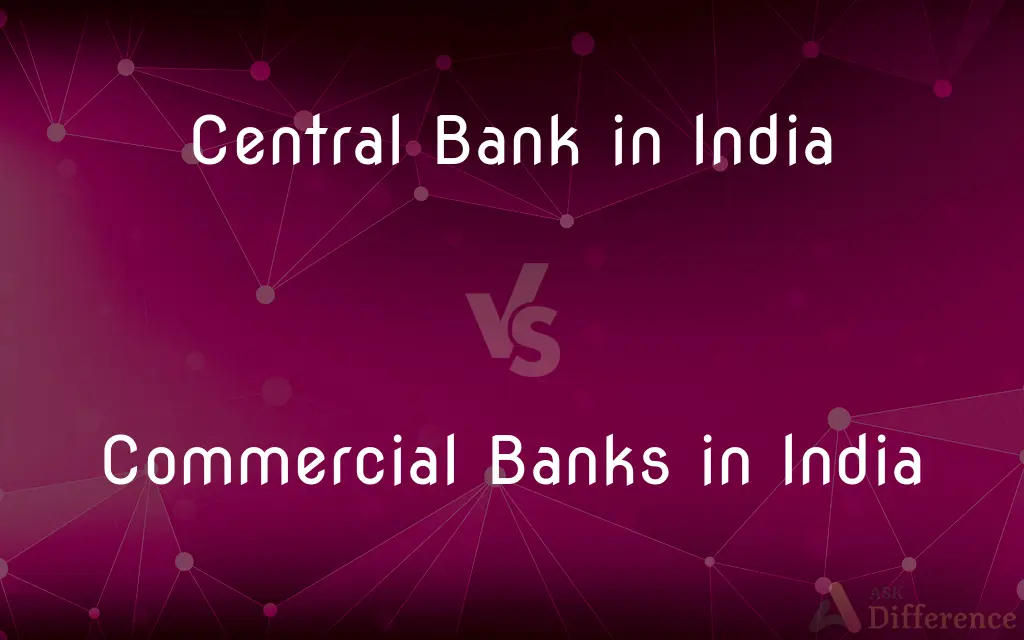Central Bank in India vs. Commercial Banks in India — What's the Difference?
By Tayyaba Rehman — Published on December 24, 2023
The Central Bank in India (RBI) supervises and regulates monetary policy, while Commercial Banks in India provide financial services to the public.

Difference Between Central Bank in India and Commercial Banks in India
Table of Contents
ADVERTISEMENT
Key Differences
The Central Bank in India, known as the Reserve Bank of India (RBI), is the supreme monetary institution responsible for controlling the monetary policy of the Indian currency. In contrast, Commercial Banks in India, such as HDFC, ICICI, and SBI, operate as individual entities providing a plethora of financial services to individuals and businesses.
One of the primary roles of the Central Bank in India is to maintain monetary stability, ensuring that the economy remains balanced and healthy. On the other hand, Commercial Banks in India focus mainly on accepting deposits, granting loans, and offering other financial products and services to their customers.
The Central Bank in India holds the sole authority to issue (or print) the national currency, which usually serves as the nation's primary monetary unit. Conversely, while Commercial Banks in India can manage and distribute the currency, they do not have the authority to issue it.
Regarding regulation, the Central Bank in India oversees the operations of all financial institutions in the country, including Commercial Banks in India. This oversight ensures that all banking activities align with the nation's economic objectives. Meanwhile, Commercial Banks in India operate under the guidelines and regulations set forth by the RBI.
Lastly, the Central Bank in India acts as a lender of last resort for other banks, stepping in to support in times of financial crisis. However, Commercial Banks in India operate to make profits for their stakeholders and serve their customer base.
ADVERTISEMENT
Comparison Chart
Primary Role
Regulates monetary policy
Provides financial services to the public
Currency Issuance
Sole authority to issue national currency
Cannot issue currency
Objective
Maintain monetary and financial stability
Profit-making and customer service
Regulation
Supervises all financial institutions
Operate under the regulations set by RBI
Crisis Management
Acts as a lender of last resort
Seeks RBI support in financial crises
Compare with Definitions
Central Bank in India
Central Bank in India holds the sole authority to issue currency.
The Central Bank in India released new currency notes with enhanced security features.
Commercial Banks in India
Commercial Banks in India offer financial services to the public.
Many Commercial Banks in India offer digital banking platforms for the convenience of customers.
Central Bank in India
Central Bank in India manages the country's foreign exchange reserves.
To stabilize the rupee's value, the Central Bank in India intervened in the foreign exchange market.
Commercial Banks in India
Commercial Banks in India function under RBI guidelines.
All Commercial Banks in India have to maintain a certain Cash Reserve Ratio as prescribed by the RBI.
Central Bank in India
Central Bank in India refers to the Reserve Bank of India.
The Central Bank in India recently revised the repo rate to influence lending rates.
Commercial Banks in India
Commercial Banks in India operate to make profits.
Several Commercial Banks in India declared record profits in the last fiscal year.
Central Bank in India
Central Bank in India supervises financial institutions.
The Central Bank in India recently implemented stricter guidelines for digital transactions.
Commercial Banks in India
Commercial Banks in India include both public and private sector banks.
While SBI is a public sector Commercial Bank in India, HDFC is from the private sector.
Central Bank in India
Central Bank in India formulates and implements monetary policies.
Inflation targeting is one of the objectives set by the Central Bank in India.
Commercial Banks in India
Commercial Banks in India provide loans and accept deposits.
Interest rates on savings accounts vary among different Commercial Banks in India.
Common Curiosities
Who regulates Commercial Banks in India?
The Central Bank in India, RBI, regulates all Commercial Banks operating in the country.
What is the Central Bank in India?
It's the Reserve Bank of India (RBI), responsible for regulating the country's monetary policy.
Who issues currency in India?
The Central Bank in India, the RBI, holds the exclusive right to issue currency.
Do Commercial Banks in India formulate monetary policy?
No, monetary policy formulation is the prerogative of the Central Bank in India.
How do Commercial Banks in India differ from the Central Bank?
Commercial Banks provide financial services to the public, while the Central Bank oversees monetary policy and regulation.
Can Commercial Banks in India print money?
No, only the Central Bank in India has the authority to issue or print currency.
What's the primary goal of the Central Bank in India?
It aims to maintain monetary stability and ensure a balanced economic growth.
Who acts as the banker to the government?
The Central Bank in India serves as the banker to the government.
Who ensures the stability of the banking system in India?
The Central Bank in India plays a pivotal role in ensuring the stability of the entire banking system.
How do Commercial Banks in India help in economic development?
They provide loans, credit, and other financial services that boost investments and consumption.
Why are Commercial Banks in India crucial for the common man?
They offer essential financial services like savings accounts, loans, and more, facilitating day-to-day transactions.
How does the Central Bank in India control inflation?
It uses monetary policy tools like repo rate, CRR, and open market operations.
Do Commercial Banks in India hold foreign exchange reserves?
No, the foreign exchange reserves are held and managed by the Central Bank in India.
Does the Central Bank in India hold accounts for the general public?
No, individual accounts are held by Commercial Banks in India.
Do Commercial Banks in India decide their own interest rates?
They decide their lending and deposit rates, but they are influenced by the policy rates set by the Central Bank in India.
Share Your Discovery

Previous Comparison
Thermal Conductivity vs. Thermal Diffusivity
Next Comparison
Simple Carbohydrates vs. Complex CarbohydratesAuthor Spotlight
Written by
Tayyaba RehmanTayyaba Rehman is a distinguished writer, currently serving as a primary contributor to askdifference.com. As a researcher in semantics and etymology, Tayyaba's passion for the complexity of languages and their distinctions has found a perfect home on the platform. Tayyaba delves into the intricacies of language, distinguishing between commonly confused words and phrases, thereby providing clarity for readers worldwide.












































